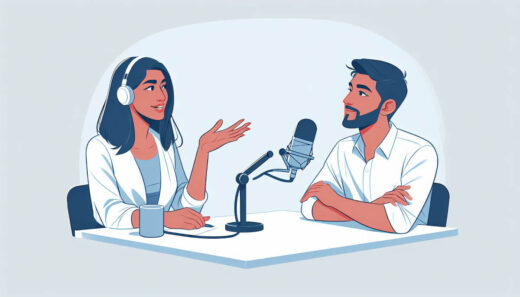Feedback is the most crucial component to improve Podcast performance. Therefore, it is very important for every podcaster to analyze and understand both general and specific feedback provided by their audience. In this article, we will delve into some general feedback provided by podcast listeners. We have aggregated thousands of reviews given to top podcasts and analyzed both positive and negative feedback. With this analysis, we have identified some common trends in audience preferences.
What Podcast Listeners Liked the most?
Knowledgeable, Passionate and Entertaining Hosts
In our analysis, Podcast host was the most crucial element for many listeners. Engaging hosts bring energy, enthusiasm, and genuine passion to their subject matter. They make complex topics accessible, keep the conversation flowing, and use humor effectively.
Additionally, chemistry between co-hosts or interviewers and guests is essential. When hosts have great chemistry, it makes the podcast more enjoyable and creates a comfortable atmosphere. This dynamic can enhance the flow of conversations and make the podcast more entertaining and captivating.
High-Quality Production
High production quality is one of the most frequently praised aspect of a podcast. A well produced podcast enhances the listening experience considerably. This includes superior audio quality, clear and concise presentation, and engaging introductions.
Listeners also appreciate great care given to audio mixing, sound design, and overall production value. This ensures an immersive and captivating auditory journey for the audience. High-quality production shows attention to detail and makes the podcast sound polished and professional.
Informative and Educational Content
Many listeners turn to podcasts to learn something new. This could involve in-depth analysis of current events, historical insights, practical advice, or explanations of complex concepts. Well-researched podcasts that cite sources, interview experts, and break down information clearly are highly valued.
Relatable and Authentic Content
Listeners connect with podcasts that feel genuine and reflect their own experiences. This could involve honest and vulnerable discussions, personal stories, or humor that resonates with their sense of humor. Podcasts that feel like a conversation with friends are often highly praised.
Listeners enjoy feeling like they can connect to the characters and themes, or personal experiences shared. Podcasts that resonate with their audience on a personal level are more likely to be well-received.
Great Guests and Interviews
Compelling guests and well-conducted interviews elevate the quality of a podcast significantly. Expert guests provide valuable insights and knowledge, while personal stories from guests can be both moving and relatable. Skilled interviewers ask thought-provoking questions, create a comfortable atmosphere for guests to open up, and guide the conversation effectively.
Great Storytelling
Many podcasts, particularly in the true crime and fiction genres, rely heavily on captivating storytelling. This involves crafting a compelling narrative, using vivid language and imagery, and creating an immersive atmosphere through sound effects and music.
Listeners rave about unique, creative, and well-crafted narratives that keep them guessing. Compelling storytelling often involves a blend of suspense, humor, and thought-provoking themes. Listeners enjoy being surprised by unexpected twists and turns while also relating to the characters and themes presented.
Community and Connection
Many podcasts foster a sense of community among listeners. This can be achieved through social media engagement, live events, or simply by creating a welcoming and inclusive atmosphere where listeners feel comfortable sharing their own experiences and thoughts.
Laughter and Joy
Many Podcast listeners appreciate entertainment and laughter. This could involve witty banter between hosts, humorous storytelling, or simply lighthearted and fun conversations. Podcasts that bring joy to listeners, especially during challenging times, are highly valued.
What Podcast Listeners Disliked the most?
Excessive and Disruptive Advertisements
This is the absolute top complaint. Listeners feel bombarded by ads, especially when they’re long, loud, and poorly placed. Mid-story interruptions shatter immersion, while frequent breaks disrupt the flow of conversations. The frustration is amplified when listeners perceive a poor content-to-ad ratio, feeling cheated out of valuable listening time. Many are willing to pay for an ad-free experience, but even then, they feel let down by excessive self-promotion or product placement within the paid content.
Host’s Personality and Behavior
A host can make or break a podcast. Listeners often cite hosts as arrogant, condescending, narcissistic, or lacking self-awareness. Interrupting guests, dominating conversations, and failing to listen attentively are major turn-offs. Excessive laughter, annoying vocal tics, and an unpleasant voice or delivery style can also drive listeners away.
Political Bias and Agenda-Pushing
Podcasts should inform and entertain, not preach. Listeners express frustration when hosts inject their political views, especially if it’s one-sided, lacks nuance, and comes across as propaganda. This is especially problematic in podcasts that are expected to be non-partisan, like those covering history, true crime, or even science. Listeners want diverse perspectives and balanced discussions, not echo chambers that reinforce pre-existing beliefs.
Poor Audio Quality and Editing
No one wants to strain to hear a muffled voice or be startled by a sudden blast of loud music. Inconsistent volume levels, background noise, and poor editing are major distractions. Technical glitches, abrupt cuts, and excessive sound effects all contribute to an unprofessional feel and a poor listening experience.
Lack of Depth, Originality, and Research
Listeners are hungry for insightful content, not superficial chatter or rehashed information readily available elsewhere. Vague advice, repetitive topics, and a lack of structure leave them feeling unsatisfied. They value thorough research, accurate facts, and well-supported arguments, not unfounded opinions or speculation presented as truth.
Inaccurate or Misleading Information
Podcasts hold a position of trust. Spreading misinformation, especially on sensitive topics like health, finance, or politics, is deeply damaging. Listeners expect hosts and guests to be knowledgeable and credible, not to present biased opinions or outdated information as fact. A lack of fact-checking or a failure to acknowledge and correct mistakes erodes trust and can have real-world consequences.
Inappropriate or Offensive Content
Humor is subjective, but there’s a line. Listeners are often put off by excessive profanity, crude jokes, and insensitive comments, particularly when directed at vulnerable groups. Sexism, racism, and other forms of bigotry are unacceptable. Podcasts should strive for inclusivity and respect for diverse audiences, not perpetuate harmful stereotypes or normalize hateful rhetoric.
Repetitive Content and Infrequent Updates
Podcasts thrive on fresh perspectives and consistent engagement. Rehashing old episodes, relying on filler content, or posting infrequently leads to listener fatigue. Listeners want to be captivated by new stories, insightful interviews, and original perspectives, not re-treads of familiar territory or long gaps between episodes.
Co-Host Dynamics and Chemistry
The chemistry between hosts can elevate or sink a podcast. Listeners often complain about co-hosts who interrupt, dominate conversations, or simply don’t add value. Awkward dynamics, excessive banter, and a lack of genuine rapport can make for an unpleasant listening experience.
Subscription and Paywall Issues
Podcasts have traditionally been a free and accessible medium. Some listeners will obviously get frustrated by paywalls, limited free content. They also don’t like aggressive promotion of premium subscriptions, especially when they feel the value proposition isn’t clear or the content quality doesn’t justify the cost. Technical issues with accessing paid content or difficulty unsubscribing add to the frustration.



